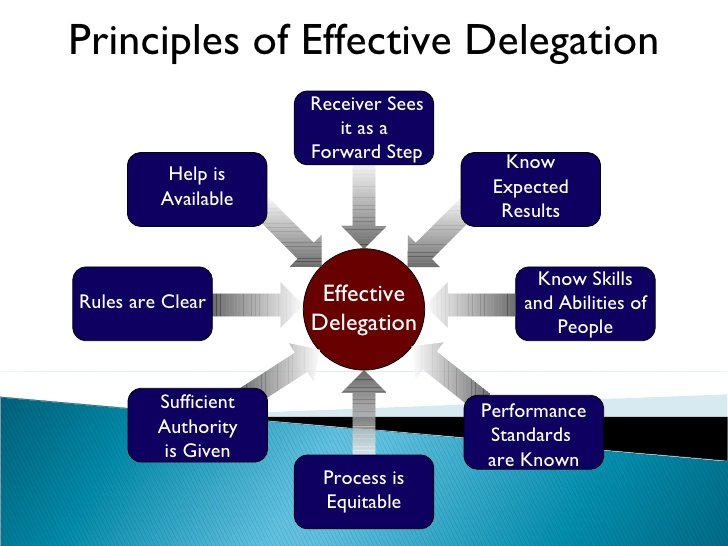Do you absolutely hate failing? You’re in luck because, today, you’ll learn the art of how to tackle failure in your work life. The magic trick is called delegation of authority.
Failure is often a result of excess burden. When you take on more than you can handle, you are unable to perform well, even if you have the expertise to do it perfectly. It’s demotivating, a waste of time, and extremely annoying.
Let’s take a deep look into the delegation of authority to figure out how to make the most of it.
What Does It Mean to Delegate Authority?
Delegating authority is neither magic nor rocket science. It is exactly what it means: division of workload and distribution of power.
Now, this is where most superiors get worried. They misunderstand the idea and believe that distribution will take away their authority.
However, the division and distribution of authority are like giving the entire team autonomy over their own job, but their control is limited to just that.
The superior still has supremacy over all the employees.
Authority delegation minimizes the workload of the superior. This work is broken down into smaller tasks and spread out into a team so that every member works simultaneously to finish the project in a shorter time.
3 Elements of Delegating Authority
The delegation of authority has three elements:
1. Assigning Responsibility
This is the first step in the process. A person who is in charge, such as a manager or a team leader, assigns other team members certain tasks that have to be completed in a given period. Of course, this is only possible if the superior has more control and authority in the work environment than the subordinates.
2. Granting Authority
The next step is to give the subordinates enough authority and responsibility for them to complete the task and act independently.
⌄ Scroll down to continue reading article ⌄
So, let’s say you are a supervisor who allocated one person in your team to do a certain task. This assignment will be useless to you if the subordinate has to come to you every step of the way to get permission and signatures required to fulfill the allocated job.
Unless you’re giving authority, you aren’t delegating. Instead, you’re only assigning a task, and that won’t bring you any benefits.
Also, granting authority puts the subordinate in charge. This person is now responsible for doing what they’re assigned, however they like. It’s up to them how they tackle obstacles. All that you as the supervisor should be concerned about are the final results.
3. Maintaining Accountability
There’s always a risk that some team members may not act responsibly, especially when they have been given authority over the assigned task. This is why you have to make every employee or team member accountable through some rules and regulations.
The superior must always have the right to ask the responsible person about their task. Creating an accountability culture in a company is important, and accountability goes upwards in the hierarchy of a work environment. Never offer any leniency in this regard if you want to ensure quality outputs.
This step of giving and receiving feedback helps improve the future work ethic immensely.


Why Is It Important to Delegate Authority?
Many times, superiors take on all the duties because they have a hard time trusting someone else to do the job as well as they would do themselves.
That’s a valid concern, and it may keep you from getting the most out of authority delegation.
But, with this risk comes a long list of benefits. It is actually important to delegate authority for the betterment of your organization and team.
Superiors Can Perform Better
The most important benefit of delegating authority is that the manager divides authority and gets the time to do their actual job.
⌄ Scroll down to continue reading article ⌄
As a supervisor, your first duty is to maintain the flow of your team. With your workload minimized and more time at hand, you can pay attention to the minor details.
It gives supervisors the time to look at the more important stuff. Simultaneously, they get a chance to test which team members are most efficient. In case of any problem, the delegator has enough room in their schedule to sit down to figure out a solution.
All in all, it leads to a more efficient performance from the supervisor’s side.
Subordinates Learn With the Flow
With a degree of authority in their hands, the subordinates begin to feel useful and important. This feeling is the most important route to improvement.
As your subordinates work independently, they not only improve their existing skills, but they also perform better. Since they are ones in control, they are the only ones accountable for everything they put on the table. This sense of responsibility provides the mandatory boost of motivation.
Moreover, with the delegation of authority, the superiors and subordinates work on the same level to a certain extent. This allows the team members to learn from their supervisors while also polishing their knowledge practically.
Leads to Better Relationships
If you’re in charge of any team, work as a manager, or own an organization that you run, you already know why employee-employer relationships are vital.
The same applies to every workgroup.
So, even if you’re just one small group of 5 people in a multinational organization, the rules are coherent.
By letting go of some responsibilities and giving individuals a chance to grow, you’re spreading positive work vibes. It all works in a cycle where you give the team some authority, they feel important and outperform, your trust in them strengthens, and you continue to delegate authority moving forward.
5 Tips to Delegate Authority Effectively
There is a whole mechanism that supports the delegation of authority.
⌄ Scroll down to continue reading article ⌄
If done right, this concept has numerous advantages. However, the key is that it’s done right.
1. Choose the Best Person
It’s not easy to trust another person to do something that you would have preferred to do yourself. That is why it is crucial that you only delegate a task to someone that you have full faith in.
The easiest way to do this is to pre-asses every team member’s skills and qualities. In your mind, have a clear idea of who does what best. So, if there is one particular individual who excels at technology, you will know where to go every time there’s a job related to that skill.
Once you’re satisfied with who is in control, more than half of the issue is resolved and things will most likely go smoothly.
2. Offer Enough Autonomy
One huge mistake you may make is to break down tasks too much.
Let’s say your team of 10 people has to arrange an office party for 100 people. You have to manage the location, decorations, food, and furniture.
You can either assign 4 individuals each of the 4 main jobs, or you can divide each component further into small tasks.
In the case of the latter, tasks will overlap, things will get confusing, and none of your team members will have full control over their assigned task.
This generally leads to a final result that is extremely non-coherent.
3. Clear Communication
A major aspect of delegation is the availability of clear instructions. From details of the task to deadlines, the person who has to fulfill the job should be clear on every single detail.
Unless they know what’s expected from them, they will never be able to satisfy the delegator.
⌄ Scroll down to continue reading article ⌄
You can learn more about effective communication in this article.
4. Avoid Unnecessary Pressure
Yes, diamonds only form after the charcoal is put under immense pressure. But, honestly, you don’t need to implement that strategy in your work environment when implementing delegation of authority.
Offer plenty of time and flexibility for each individual to be able to offer their best performance.
Some people may work better under pressure. In that case, let the individual make that decision for themselves.
5. Offer a Helping Hand
Just because you’ve given someone else the task and power does not mean you have to back off completely.
In fact, you should try to be a part of the process, but only from outside a defined boundary. This is something you’ll have to figure out practically as per the needs of your work environment. However, it will ultimately lead to you being a more respected leader:
The important point is that if someone is facing an issue with the delegated task, do not refuse to help. Offer advice and support readily so that your team can learn from you. It will end up benefiting your organization.
Final Thoughts
Conclusively, it is safe to say that the delegation of authority is a very helpful technique to adopt in workplaces. It allows for a positive working environment as well as fruitful results.
It’s something that all leaders should implement to achieve a time-efficient and productive workspace!
More on the Importance of Delegation
Featured photo credit: Dylan Gillis via unsplash.com




















